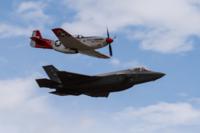If it hadn't been for World War II, Donal "Mike" O'Callaghan might have stayed in Wisconsin and become a farmer like his dad. But the government wanted to expand an artillery range and condemned the family farm. Thus, O'Callaghan — who later served two terms as governor of Nevada — began an odyssey through three different branches of the military that would end in decorated service.
O'Callaghan joined the Marine Corps as soon as it would take him, but he turned 16 a little too late for World War II combat and was assigned to guard prisoners on Guam, finishing his stint as a sergeant. O'Callaghan's parents had relocated to Washington, near the Idaho state line, so he joined them, doing a little ironwork, a little junior college in nearby Boise, and a little boxing — until, along with some friends, he decided to join the newly minted Air Force.
O'Callaghan trained as an intelligence officer and was posted to Alaska just as the Korean War broke out, again putting him far from the combat zone. However, a new policy authorizing interservice transfers to the Army was O'Callaghan's ticket to the front lines. The Army was using up infantry-platoon leaders faster than they could be trained, so anyone in the other branches who could pass a qualifying test was welcome. O'Callaghan was so eager to see combat that he signed a waiver releasing the Army from sending him to Officer Candidate School. He went to Korea as a private.
"I wanted to get into combat," O'Callaghan told a journalist in 1999. "I had been trained for it, and I thought, why send some kid over when I had that training?" He figured he would get a battlefield commission. Although that didn't happen, he was awarded a Bronze Star with a "V" for valor for his actions on Dec. 24, 1952.
But his greatest heroism and highest decoration, the Silver Star, came on Feb. 13, 1953, when O'Callaghan exposed himself to enemy fire to save men at an out-guard post. After taking a hit in the lower leg from an 82-mm mortar round, he rigged a tourniquet out of telephone wire, using a bayonet to twist it tight around the wound. His award citation recounts the rest: "He crawled back to the command post and, from that position, controlled platoon action for the next three and one-half hours, giving orders over the phone. Not until the enemy had withdrawn did he permit himself to be evacuated."
O'Callaghan went home a hero. His mangled left leg had to be amputated below the knee. After an active life in teaching and politics, he bought several newspapers in 1981 and was the executive editor and chairman of the board of the Las Vegas Sun until his death in 2004.















